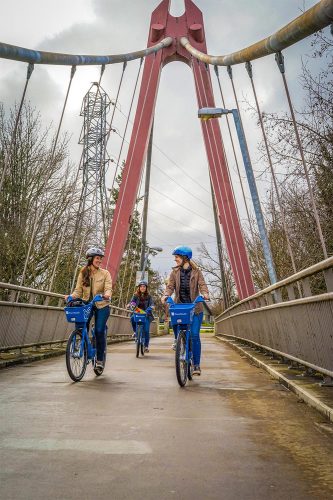
Cyclists in the Eugene area could soon feel the effects of trade tariffs imposed by the Trump administration on most bike products. This comes on top of a new Oregon excise tax on some bicycle sales.
In 2017, the Oregon Legislature passed House Bill 2017. Included in the bill is a $15 bicycle excise tax to be collected starting January 2018.
The bill was signed into law by Gov. Kate Brown. The tax applies to all new bicycle sales with a retail purchase price of $200 or more, propelled exclusively by human power and with wheels 26 inches or larger.
To counter the tax, Paul’s Bicycle Way of Life is offering a $15 coupon on all applicable bikes. “Most people don’t feel bad about contributing to a bike path,” says Matt Ritzow, Paul’s general manager and part owner.
The tax is intended to maintain bicycle infrastructure, Ritzow explains. But the problem, as he sees it, is that the tax pushes an unfair portion of overall infrastructure upkeep onto cyclists.
Local retailers like Paul’s see the adverse effects of the tax as opposed to big-box retailers, Ritzow says.
In addition, Ritzow says he feels infrastructure funds would be better raised with higher car registration fees and gas taxes. When it comes to the new excise tax, Salem went after low-hanging fruit, he says, targeting a group lacking the resources to put up a fight.
“It’s not cyclists riding across I-5 bridges that are creating damages,” Ritzow continues.
“We have many people that use their bikes to reduce emissions and be healthier,” he adds. “They should be getting a tax credit.”
Cyclists in the Eugene area could also soon feel the effects of increased trade tariffs imposed by the Trump administration on most bike products. In response to the federal tariffs as well as the Oregon tax, prices on cycling products and components are expected to rise.
This comes as the popularity of electric bikes and scooters, as well as bike and e-scooter sharing programs, increases in cities across the nation. Just last spring, Eugene saw the debut of PeaceHealth Rides, a bike-sharing service, and Portland has both bike and e-scooter sharing programs.
A representative of Bird, the administrator of Portland’s e-scooter sharing service, says there are no plans to expand to Eugene at this time, “but we believe Eugene would be a great place to provide our accessible, affordable, environmentally friendly transportation option. We hope to collaborate with the city officials to bring Bird’s service to Eugene in the future.”
Ritzow says imports of electric scooters and bikes are some of the few growth areas in the industry. Many are turning to e-bikes and e-scooters as reliable commuter vehicles, and the price has been coming down.
“The cost coming down on those bikes really is good,” Ritzow comments. But the vast majority are built in China, he adds.
In addition to e-bikes and scooters, Trump’s tariffs will affect sales of all entry-level bikes. “One-hundred percent of kid’s bikes,” Ritzow says.
To get around the tariffs, Chinese companies will likely shift production to places like Vietnam or Cambodia. Tariffs on Chinese bike products will not bring production back to the U.S., Ritzow says.
“In this case there is no bicycle factory in the U.S. capable of taking up this black hole that’s being created,” he continues. “It will not bring production of $500 bikes back to the US. It will not be possible given our resources.”
He calls Trump’s tariffs “capricious and not-thought-out policy,” adding, “There’s going to be lost jobs in the U.S.”